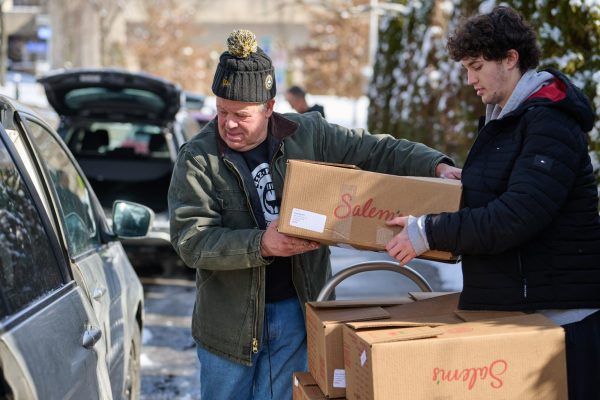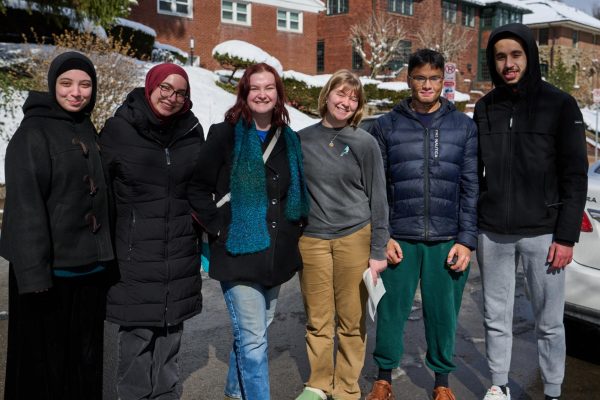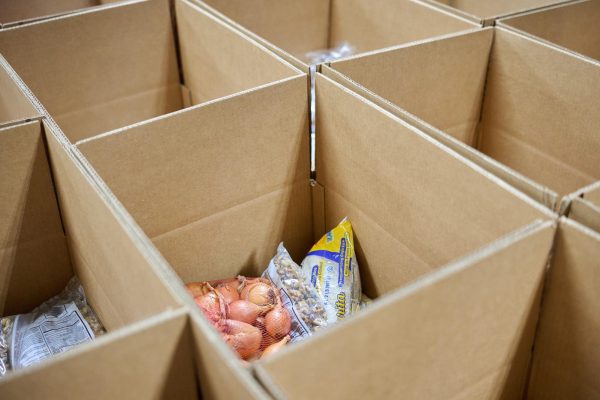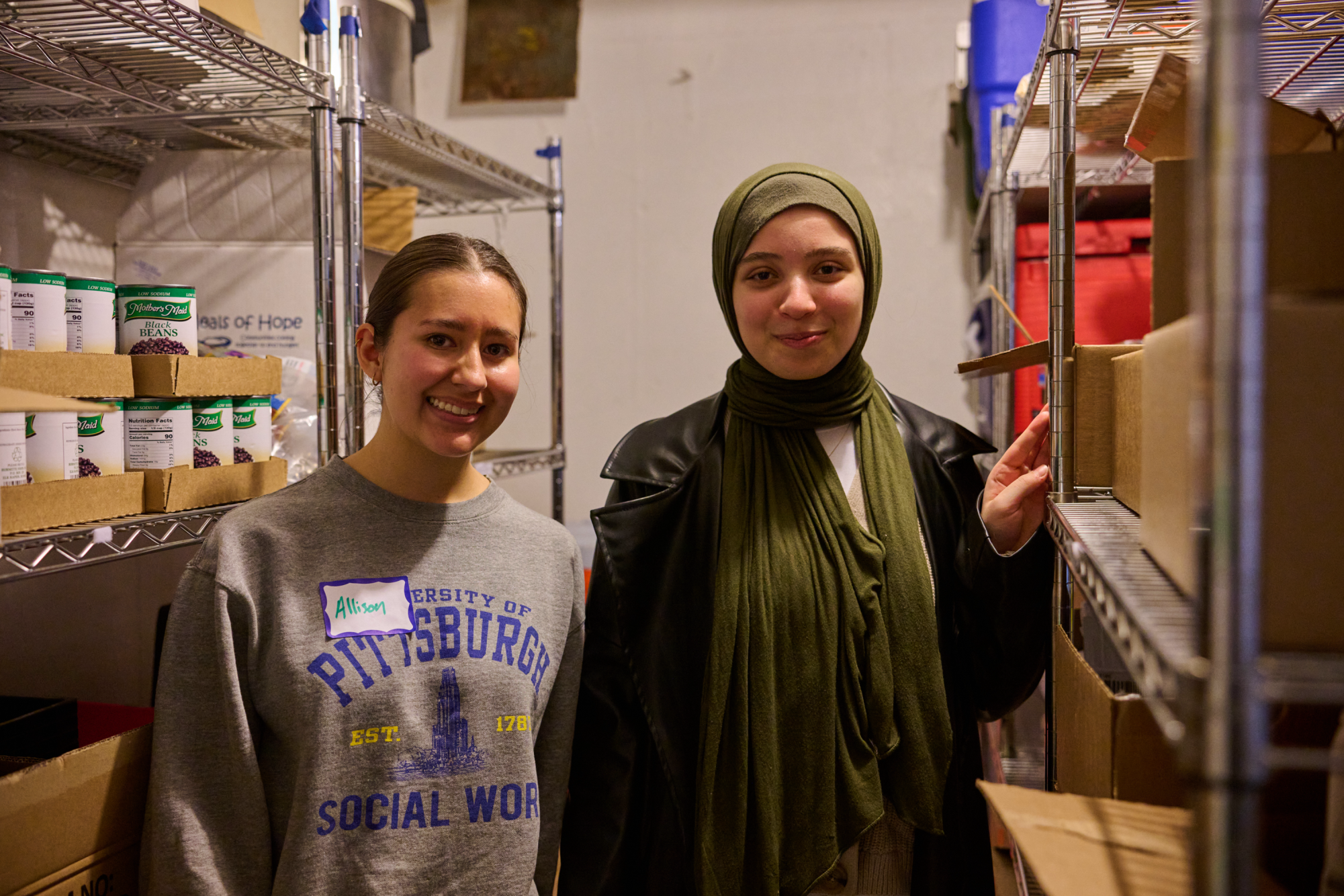The morning of Feb. 16 was the kind of frigid cold that makes most people stay curled up and cozy in bed. Despite the chill, a merry frenzy of volunteers was busy packing, carrying and delivering boxes of food and supplies to local families at the Islamic Center of Pittsburgh’s monthly food pantry.
Around 30 volunteers participated in February’s food distribution, which served approximately 130 families in the greater Pittsburgh area. That morning, some volunteers

labeled boxes of donations with their contents, while others formed a fire brigade-like line up the stairs from the center’s basement to pass the boxes on to other volunteers loading them into cars.
There were frequent calls of “Behind!” “Watch out!” or “Wait, this one still needs chicken” — but even more peals of laughter and excited catch-ups between friends. Malak Ayoub, a Pitt sophomore neuroscience major and ICP pantry board member responsible for client services, said she’s always impressed by the volunteers’ willingness to give up a weekend each month.
“A lot of people might not come, you know — these times are kind of inconvenient,” Ayoub said. “But surprisingly, we do see the same people every month. People love it for the same reason I love it.”
The food pantry is affiliated with the ICP, whose building, cradled by the picturesque mansions of Schenley Farms, is not only a mosque but has also become a community center. For some volunteers like Ayoub, service through the food pantry is part of an expression of faith, with charity being a major cornerstone of Islamic faith.
“It’s at a masjid, and the masjid is what started it. In Islam, it’s an obligation on those who are capable to do service, community service, things like this,” Ayoub said. “Charity is an obligation.”
But she said many people volunteer at the ICP regardless of their connection to Islam, adding, “It’s symbolic, kind of. It’s really sweet.”
Beyza Tuncer, a 2023 Pitt graduate, agreed with Ayoub.
“It’s really nice to see everyone from all different faiths, backgrounds [and] identities come together and volunteer for the same purpose,” Tuncer said. “Everyone has the same goal and same mission.”
Ten young volunteers, almost all Pitt students or alums, make up the pantry’s leadership board. Board members are responsible for calling and coordinating with clients, ordering and finding grants to pay for food and managing other volunteers. Each month begins with a hefty logistical effort from the board and concludes with a day of distribution.
On the third Friday of each month, volunteers assemble and pack hundreds of boxes with pantry staples, household supplies, toiletries and more. Each box is tailored to the requesting family’s size, dietary restrictions and needs. Fresh produce, fish and dairy, as well as halal meat donated by local business Salem’s Halal Market & Grill, are boxed up the following morning and picked up by pantry clients or delivered by car.
Beginning during the COVID-19 pandemic, the pantry partnered with the Pittsburgh organization 412 Food Rescue to deliver food and supplies right to recipients’ homes. Food Rescue volunteers sign up for routes on the organization’s app, pick up the boxes at the ICP and deliver them. This option is especially helpful for families that can’t physically make it to pick up food, which can be a barrier to service at other pantries.
Ayoub said she’s made connections with drivers, volunteers and clients alike and formed her own community, something she sought when she first moved to Pittsburgh.

“I’m new to Pittsburgh, and I didn’t know that I was looking for this, but I just wanted a way to involve myself in the community,” Ayoub said. “My family is still overseas, so to have something that tethers me, that makes me feel happy — it’s just so fulfilling, and I love working with the clients and the drivers. It’s really my favorite time of the month. I love seeing them.”
Aqsa Owais, a Pitt sophomore bioengineering major who started volunteering as a first-year, feels similarly.
“For me, this created a big sense of community,” Owais said. “I’d come every month, and I’d see the same people every month, or I’d meet new people and catch up on their lives, see what’s happening in different parts of Pittsburgh. It kind of made Pittsburgh as a city feel smaller.”
Many of those who serve at the pantry are Pitt and Carnegie Mellon students drawn in by the relationships they’ve built with fellow volunteers, a desire to serve or the alluring promise of service hours that count toward professional school or Greek life requirements. Several come back month after month — some year after year, like senior ecology and evolution major Daphne Plantner. She has volunteered every month of the academic year since she her first-year at Pitt.
“The coolest part to me is the students who run it, and the amount of time that they dedicate to it, and the amount of energy they dedicate to it, to making this,” Plantner said. “There’s a lot of moving parts, and I’m just happy to be able to help with that however I can.”
While the board and many volunteers are young, Tuncer emphasized that the food pantry is a truly intergenerational effort thanks in large part to the volunteers from 412 Food Rescue.
“Most of those volunteers are retired — most of them aren’t students,” Tuncer said of 412 Food Rescue. “They mostly live around Pittsburgh and they just decide to help, which is really nice.”
The food pantry serves anyone in need of food, regardless of religious affiliation. Tuncer stressed that the pantry’s volunteers are there for everyone.
“It just comes naturally to serve and give back to our community regardless of their religion, race or identity,” Tuncer said. “We aim to serve everyone equally with no judgment.”
The pantry serves over 100 families every month, ranging from small to large, new to Pittsburgh to longtime residents. Because of their ties with the Islamic Center and the delivery option, the pantry is able to serve groups who might be missed by other food insecurity relief measures, like recent immigrants or people without ready access to transportation.
“There’s so many refugees from all over the world, like Afghanistan and Syria, that come to the mosque each month looking for help,” Tuncer said. “And food insecurity is a big issue within the Pittsburgh community. Everyone that comes to volunteer is aware of that, and they just want to be a helping hand within the mission of helping the greater community.”
Ayoub said she tries to provide personal support along with the food pantry’s supplies when she has monthly check-in calls with clients new to the country, speaking with affection for the people she helps serve.
“It’s hard being in a country that’s kind of new, and you need help. It’s hard. It’s not a mystery that immigrants have a really difficult time adjusting. So we’re just always there — for them. I have a lot of conversations with the clients, and I’ll talk to them for a while on the monthly call, as if they’re my friends,” Ayoub said.
Throughout the distribution, volunteers demonstrate their dedication to the community above all else — and show humility in how often they brought up the efforts of their fellow volunteers. Even as she herself directed the flow of box traffic in the ICP basement, Owais praised others who chose to dedicate their time to service.
“The drivers are all volunteers,” Owais said. “They have no obligation to spend their Saturday mornings driving around Pittsburgh delivering food. But they do it, and it helps so many people.”



